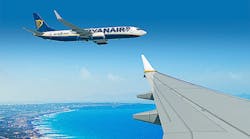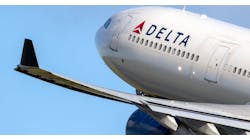Boeing Commercial Airplanes will launch a new variant of its forthcoming 737 MAX aircraft with Ryanair, the largest low-cost carrier serving the European market. Dublin-based Ryanair currently serves almost 180 destinations, and claims to be the world’s largest “international scheduled airline,” with a fleet of about 300 Boeing 737 800 jets.
Ryanair is already due to delivery of the first of 180 new Boeing 737-800 aircraft, which will increase the carrier’s fleet total from 304 to 420.
Now, Ryanair is committed to buying 100 of the new 737 series, the 737 MAX, which will be powered by the new CFM International LEAP-1B engines. The first jet in the new 737 series will be introduced in 2017, and Boeing has orders for more than 2,300 of the new jets.
The first of the 100 new jets will be delivered to Ryanair in 2019.
The initial order is valued at $11 billion, and Ryanair also has options for up to 100 more of the jets, which would double that value to $22 billion if fully subscribed.
Boeing stated it developed the 737 MAX 200 in response to the needs of low-cost carriers, which are forecast now to represent 35% of single-aisle airline capacity by 2033. The 737 MAX 200 will provide low-cost carriers with up to 11 more seats of potential revenue and up to 5% lower operating costs than the 737 MAX 8.
"The 737 MAX 200 is the perfect fit for Ryanair, providing improved efficiencies, 20 percent lower emissions, increased revenues and a high level of passenger comfort," stated Boeing Commercial Airplanes president and CEO Ray Conner. "The new variant will play a significant role in enabling the airline to continue to expand its operations, while providing passengers across Europe with outstanding value."
According to CEO Michael O’Leary, "Ryanair is proud and honored to become the lead operator of Boeing's 'gamechanger' 737 MAX 200, which will expand our fleet to 520 aircraft by 2024 and create another 3,000 new jobs for pilots, cabin crew and engineers in Europe, while allowing us to grow traffic from 82 million last year to over 150 million annually by 2024."










